Examine Your Stools
For healthy people, we are able to defecate once or twice per day without straining. The stool should neither be too hard nor too soft, and should not have a foul odor. There also should be no pus, blood, mucus or undigested food in it. Asking about the bowel habits is an indispensable step during a TCM consultation, physicians usually pay attention to the frequency, form and color of the stools as well as the accompanying feelings during defecation.
Nature of stools
- An offensive odor of stool pertains to heat accumulation.
- Dry, dark-brown stool means excessive heat has accumulated in the large intestine.
- Extremely dry and hard stool is often due to depletion of blood or body fluids, which can be seen in postnatal and recovery stage of major illness.
- Loose stools with a fishy odor pertain to excessive cold in the intestines.
- Loose bowels with shapeless stool are usually due to deficient and cold disharmony of the spleen and stomach.
- Initial discharge of a hard stool and then discharge of a loose stool can be seen in dampness accumulation, which is due to a spleen deficiency or middle qi insufficiency.
- Alternate dry and loose stool with irregular patterns are due to disharmony between the liver and spleen.
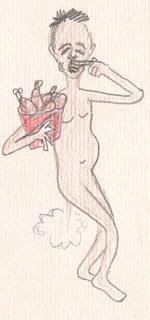
- Stools with partly digested food and a rotten odor are caused by improper food intake, which leads to food retention. Individuals will also pass excessive gas.
- Stools containing completely undigested food is a sign of kidney yang exhaustion.
- Stools with yellow mucus accompanied with tenesmus (rectal heaviness) means damp-heat has accumulated in the large intestine.
- Mucus and bloody stools are seen in dysentery.
- Sour stools in children are due to food retention without proper digestion.
Constipation
Constipation refers to infrequency or difficulty in defecation and may be accompanied with dry or hard stool. TCM claims that it is often due to heat accumulating in the intestines or insufficient lubrication in the bowels, that lead to sluggish transmission movements along the digestive tract. TCM usually divides constipation into four types:
- Heat type: excessive heat that consumes the body fluid, and maks the content in the bowel unable to flow smoothly along the digestive tract. Individuals have to pass dry or hard stools with strain, and are less frequent to defecate. Other accompanying signs are a red face,bloodshot eyes, mild feverish body, thirst, foul breath, a bitter taste in the mouth, sores in the lips or mouth, irritability, abdominal fullness and abdominal distention with pain that aggravated by pressing. On examination, the tongue is red, covered by a yellow dry fur; the pulse is rapid.
- Cold type: Individuals have difficulty in defecation with dry or normal stool texture. Other accompanying signs include abdominal distention with pain that aggravated by pressing, a pale complexion, limb coldness, an aversion to cold temperatures and a preference to drink hot beverages. On examination the tongue is pale and bulky, and the pulse is deep pulse and slow. This is a disharmony of cold evil accumulated internally that results in stagnated qi movements in the intestines.
- Qi type: The stools are hard or normal in texture, but individuals feel difficult to pass stool even though they have an strong urge. Other usual associated signs are fullness in the chest and rib sides, frequent belching, reduced appetite, and even distention and pain in the middle abdomen. On examination, the tongue is covered by thin and greasy fur; the pulse is taut.
- Deficiency type: Individuals have an urge to defecate but it is difficult, and, many persons will try forceful straining to release the stool. In some cases, extremely dry hard stools like sheep feces are discharged. Other accompanying signs are a pale and sallow face, dizziness, breath shortness and fatigue.On examination, the tongue is pale; the pulse is fine and hesitant. This is a disharmony of depletion of blood and body fluids, or, it is due to deficiency of both qi and yin. This kind of constipation is often seen in chronic illnesses, elder people and women who have just given birth.
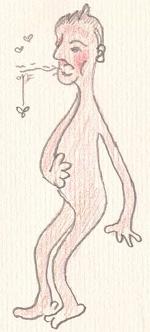 |
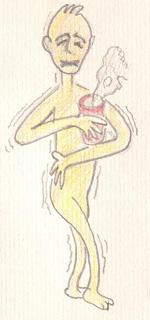 |
| Heat type constipation usually has a foul breath | Cold type constipation is usually sensitive to low temperatures |
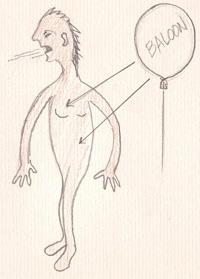 |
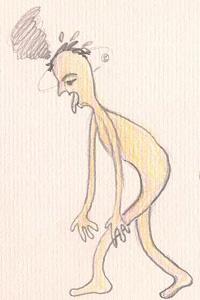 |
| Qi stagnation constipation usually feel bloating | Deficient type constipation often feel fatigue and short breath |
Diarrhea
Diarrhea means frequent defecation with loose or watery stools. TCM believes this symptom is often caused by an attack of exogenous pathogens, improper diet or yang deficiency of the spleen and kidneys, which make fluid and dampness descending and affect the transmission process of the digestive tract. TCM divides diarrhea into the following six types:
- Damp cold: The diarrhea is characterized by loose and watery stools with slight yellow color and foul odor. Other accompanying signs include a bland taste in the mouth, fullness in the gastric and upper abdominal regions, abdominal pain, intestinal rumblings and a poor appetite. There may also have alternating chills and fever, headache, nasal congestion and general aching. On examination, the tongue is covered by thick white fur; the pulse is slow and hesitant.
- Damp heat: Individuals usually start with abdominal pain followed by diarrhea, passing dark brown color, formless, mucus and foul odor stools with great frequency. Other signs include intestinal rumblings, chest oppression, thirst, scanty urine and a burning sensation in the anus. On examination, the tongue is red and covered by yellow, thick and greasy fur; the pulse is rapid.
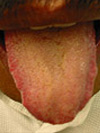
- Food damage: Individuals have foul smelling diarrhea, along with sour and rotten vomiting. Other signs include distention in the chest and abdomen, intestinal rumblings, abdominal pain that is diminished after fecal discharge, a poor appetite and fever. On examination, the tongue is covered by thick and greasy coating; the pulse is rolling. This is often due to eating unhygienic food or overeating.
- Spleen yang deficiency: Individuals may have diarrhea or just pass loose and soft stools. The situation often aggravated by eating greasy food or physically overstrain, there may have undigested food in the stools. Other signs include poor appetite, intestinal rumblings, abdominal distention, sallow complexion, underweight, low spirited , fatigue and limb weakness. On examination, the tongue is pale, bulky and covered by white fur; the pulse is weak.
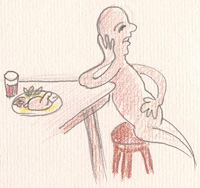
- Hyperactive liver over-restricting spleen: Individuals usually have abdominal pain and diarrhea following emotional distress such as angry, depressive or stressful. The abdominal discomfort will slightly diminish after defecation. Other accompanying sign include spirit stressful, fullness in the chest and rib sides, belching, loss of appetite, a bitter taste in the mouth, acid regurgitation, a sallow complexion and fatigue. On examination, the tongue is pink with little fur; the pulse is taut.
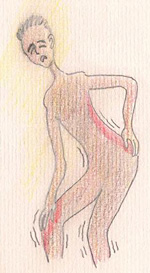
- Kidney yang deficiency: Individuals present with abdominal pain at dawn and then pass a loose bowels. The abdominal pain is relieved after defecation. Other accompanying signs include coldness and soreness occur in the waist and knees, a dull pain around the abdominal center, abdominal coldness and distention, and intestinal rumblings. On examination, the tongue is pale, glossy and bulky; the pulse is deep and fine. This is due to the kidney yang failing to warm the spleen.
Blood in the stool
This can occur as blood appeared during passing stool, after passing stool, before passing stool, or simply bleeding from the anus. The blood can be stained on the stools or mixed with the stools.
- Stool mixed with fresh blood and foul in odor is often due to an attack of heat evils in the meridians and blood vessels.
- Dysentery: Both blood and mucus are present in the watery stools. Other symptoms include abdominal pain, fever, a bitter taste in the mouth, irritability, tenesmus (rectal heaviness), abdominal urgency and yellowish urine. The tongue is red and covered by yellow greasy coating, and the pulse is rapid.
- Black, tar-liked stool is due to blood stasis, which indicates bleeding in the upper portion of the digestive system. Individuals may have dull pain in gastric and upper abdomen regions which feel better by warming and pressing, a pale complexion, fatigue, palpitations, breath shortness, limb coldness, and a low appetite, The tongue is pale and the pulse is thready.
- Red, bloody stool indicates bleeding in the lower portion of the digestive tract. Individuals may have constipation, ear ringing, dizziness, soreness and weakness in the lumbar. The tongue is dry, and the pulse is thready.
** Blood in the stool should always be evaluated by a professional as it can be a symptom of some serious medical conditions.
Fecal incontinence
This occurs when an individual is unable to control defecation and the stool is discharged out spontaneously. It pertains to yang deficiencies in the spleen and kidneys that fail to control the anus. Moreover, chronic diarrhea can lead to heaviness sensation of the anus, or even prolapse of the anus, physicians will treat by invigorating the spleen and up-lifting the middle qi for relief.


